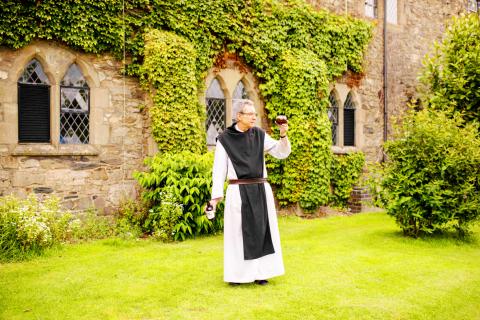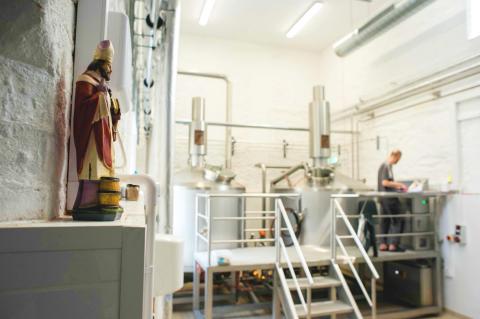A faint waft of malt drifts over the walls of the tranquil Mount St Bernard Abbey in central England as brewmaster monks are hard at work within.
Faced with dwindling revenues from dairy farming, the monks at the Trappist monastery in Leicestershire decided about six years ago to swap milk for beer.
They sold the cows and spent five years setting up a state-of-the-art brewery that can produce about 300,000 bottles a year of “Tynt Meadow” — only the 12th beer in the world to receive the centuries-old Catholic order’s coveted seal of approval.

Photo: AFP
To qualify as an “Authentic Trappist Beer,” it is brewed within the monastery’s walls under the community’s control and responsibility, and the revenue it generates is used for social service.
The dark ale with an alcohol content of 7.4 percent last year became the first British brew to be recognized by the International Trappist Association, the order’s trade standards body, following an exacting three-day audit.
Tynt Meadow is named after the plot of land in Leicestershire on which Catholic monastic life was refounded in England in the mid-19th century, about 300 years after the Protestant king Henry VIII shut down the country’s monasteries and convents.

Photo: AFP
It has found an enthusiastic following in the Netherlands and Belgium, and at home among younger Britons who are fuellng the craft beer boom.
“I think people are increasingly fed up with fake and they want authenticity,” monastery head monk Abbot Erik said. “We endeavor to live our life authentically.”
Behind solid limestone walls, a web of pipes and state-of-the-art machinery, custom-made in Germany, churn out about 6,000 bottles with each weekly brew.
The popularity of craft beers and tradition of monastic brewing made the switch from milk an obvious choice, but it also came with challenges.
“We weren’t actually aware that there was a craft beer revolution going on,” Abbot Erik said.
“We were somewhat anxious about that for a bit. I think the other Trappist breweries were also a bit anxious that too many people would want to join the bandwagon,” he said.
The spotless workspace, a former laundry, and the monks’ dedication attest to exacting standards.
One monk, obliged to miss services on brewing day to monitor the high-tech system, joins his brethren in spirit by praying in the brewery, using an iPad app to ensure he is singing from the same page.
“We have our monastic life to live and we can’t let the brewery interfere with that too much,” Brother Joseph said, adding that they would brew only the quantity needed to maintain the monastery and support charities.
Thanks to the time-honored rhythms of monastic life, the brewery unexpectedly found itself in tune with cutting-edge culture, Abbot Erik said.
“The fact we make our beer in an artisanal way, we let the processes take their time, we use select ingredients and there is an important manual component to the work” all fit in with the craft beer trend, he said.
However, it also holds deeper significance, he added.
“Something that appeals to me is that beer is made up of very simple, very humble ingredients,” he said, outside the 19th-century abbey.
“What makes a beer special is that these ingredients are brought together in a specialized environment and then allowed to mature ... and then release a potential that was inconceivable originally, when you just looked at the malt, the hops, the water and the yeast,” he said. “I think there is there something of a parable of what goes on at a deeper level in a monastic community.”
Beer enthusiasts can enjoy the tipple any time, unlike its creators.
They get a taste only on feast days, Christmas and Easter, Brother Joseph said.
“We wouldn’t be great drinkers ourselves, being monks,” he said.

‘HYANGDO’: A South Korean lawmaker said there was no credible evidence to support rumors that Kim Jong-un has a son with a disability or who is studying abroad South Korea’s spy agency yesterday said that North Korean leader Kim Jong-un’s daughter, Kim Ju-ae, who last week accompanied him on a high-profile visit to Beijing, is understood to be his recognized successor. The teenager drew global attention when she made her first official overseas trip with her father, as he met with Chinese President Xi Jinping (習近平) and Russian President Vladimir Putin. Analysts have long seen her as Kim’s likely successor, although some have suggested she has an older brother who is being secretly groomed as the next leader. The South Korean National Intelligence Service (NIS) “assesses that she [Kim Ju-ae]

In the week before his fatal shooting, right-wing US political activist Charlie Kirk cheered the boom of conservative young men in South Korea and warned about a “globalist menace” in Tokyo on his first speaking tour of Asia. Kirk, 31, who helped amplify US President Donald Trump’s agenda to young voters with often inflammatory rhetoric focused on issues such as gender and immigration, was shot in the neck on Wednesday at a speaking event at a Utah university. In Seoul on Friday last week, he spoke about how he “brought Trump to victory,” while addressing Build Up Korea 2025, a conservative conference

DEADLOCK: Putin has vowed to continue fighting unless Ukraine cedes more land, while talks have been paused with no immediate results expected, the Kremlin said Russia on Friday said that peace talks with Kyiv were on “pause” as Ukrainian President Volodymyr Zelenskiy warned that Russian President Vladimir Putin still wanted to capture the whole of Ukraine. Meanwhile, US President Donald Trump said that he was running out of patience with Putin, and the NATO alliance said it would bolster its eastern front after Russian drones were shot down in Polish airspace this week. The latest blow to faltering diplomacy came as Russia’s army staged major military drills with its key ally Belarus. Despite Trump forcing the warring sides to hold direct talks and hosting Putin in Alaska, there

North Korea has executed people for watching or distributing foreign television shows, including popular South Korean dramas, as part of an intensifying crackdown on personal freedoms, a UN human rights report said on Friday. Surveillance has grown more pervasive since 2014 with the help of new technologies, while punishments have become harsher — including the introduction of the death penalty for offences such as sharing foreign TV dramas, the report said. The curbs make North Korea the most restrictive country in the world, said the 14-page UN report, which was based on interviews with more than 300 witnesses and victims who had